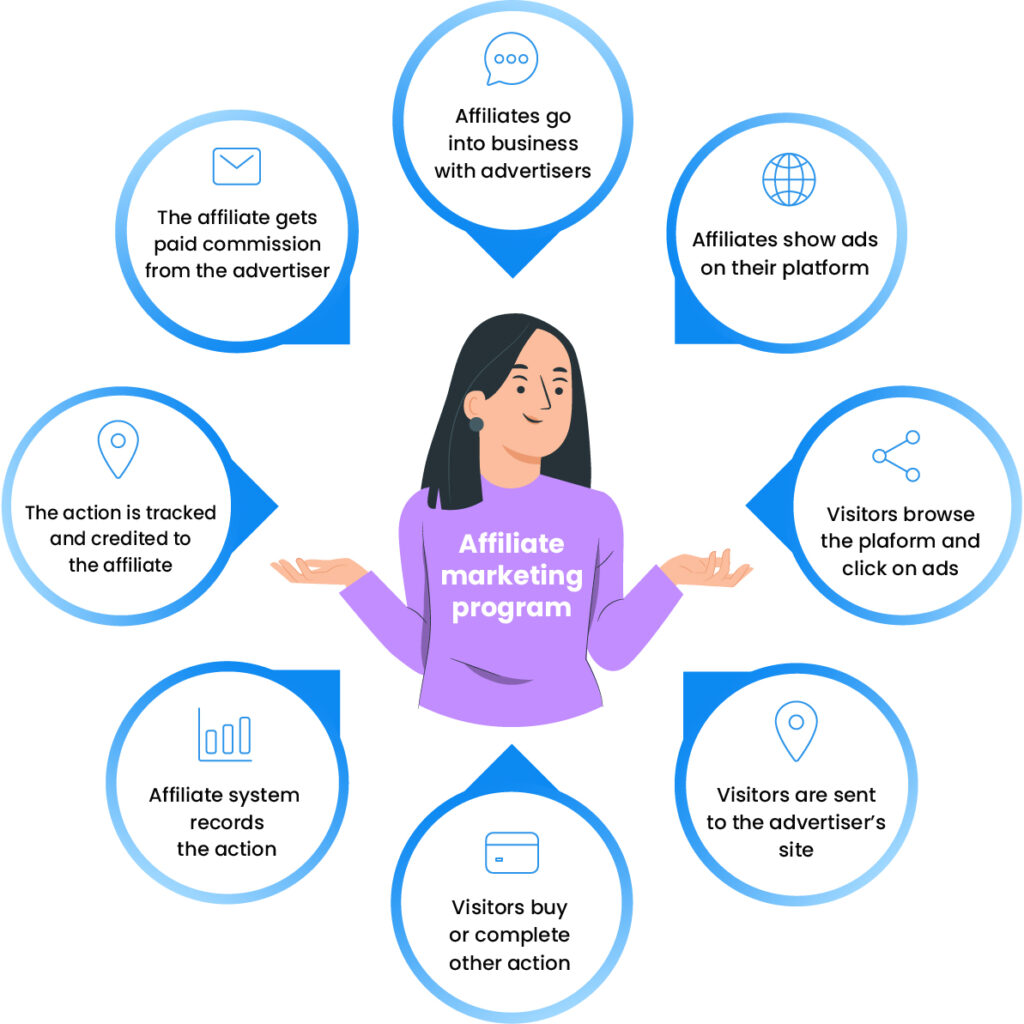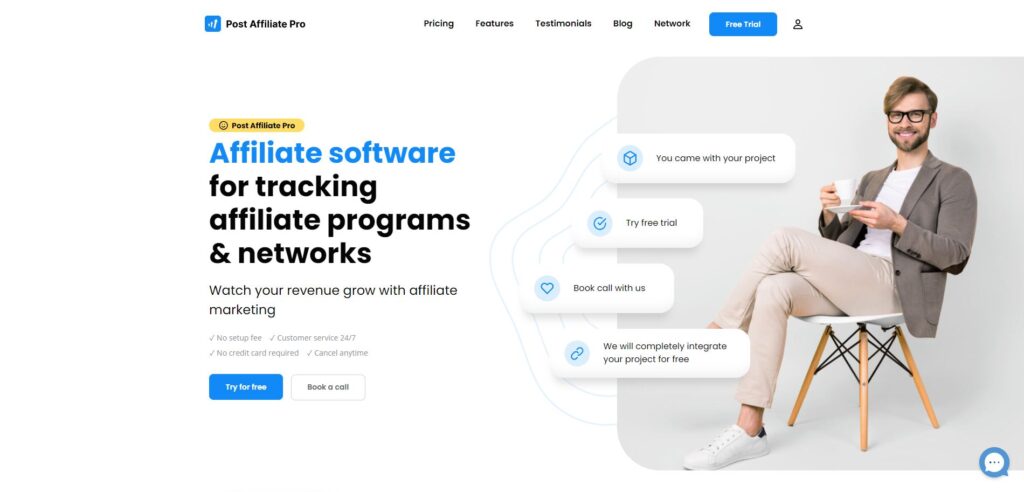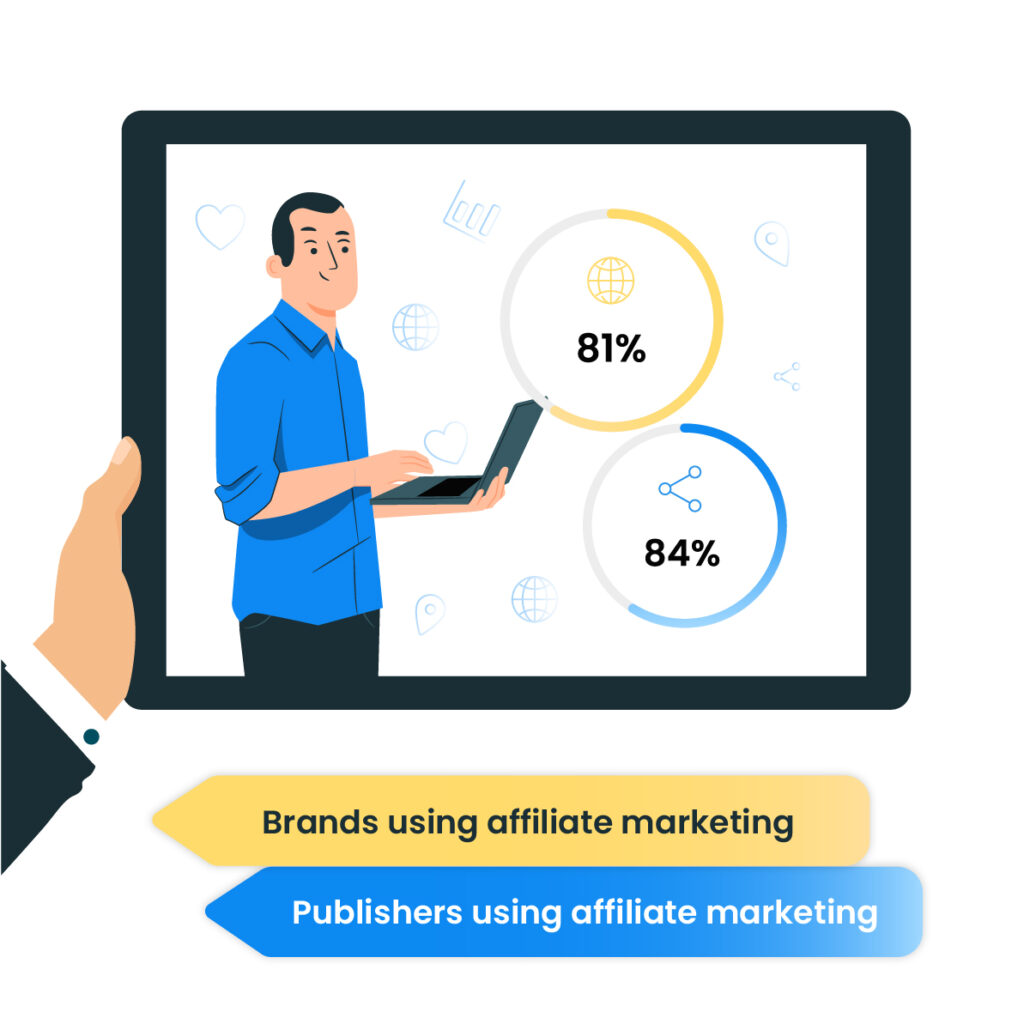Online marketing, much like the online world itself, is constantly changing. And so, an industry that had learned to rely on third-party cookies for advertising, now needs to adapt. In recent years, third-party cookie compatibility has been removed from the most popular web browsers. This meant that companies could no longer track users’ online activity, something which had always been a crucial part of advertisement and retargeting campaigns.
There is a cookieless future ahead, and affiliate marketing is ready for it.
On top of being able to work with first-party cookies, affiliate marketers have unique access to their audience. Before spending their money online, consumers often check multiple sites. And studies show that up to 74% of U.S. online shoppers visit at least 2 affiliate sites before making a purchase. This makes affiliate marketing one of the most prolific and successful forms of online advertising.
In the blog below, we will explain the concept of affiliate marketing as well as the most common types of affiliate marketers
How does it work?
Think of it this way, instead of businesses having to look where to advertise, people are willing to advertise their products for them on different platforms. This is affiliate marketing.
This is an oversimplification, of course, but it gives an idea of the type of relationship it involves.
Affiliate programs can be initiated by either party. If you have a highly trafficked website and want to earn money with affiliate marketing, you can reach out directly to various companies or use advertising services that do that for you. Affiliate marketing allows publishers to earn passive income by promoting digital or physical products that they have personally tried and believe they can recommend to their audience. This means that these now potential customers are more likely to engage with the campaign and generate conversions.

There are many ways in which affiliate merchants pay publishers. Some affiliate partnerships pay per conversion of leads, others pay per click, and some have flat rates. With these and more affiliate income options, you are sure to find a way that’s right for you.
On the other side of the partnership, the affiliate merchant benefits from increased brand awareness and a growing customer base, all while remaining one of the cheapest forms of advertising. This form of advertising is used across the board in all industries because of its efficacy and ability to reach unique consumers. Among all affiliate industries, fashion generates the most sales, with 23% of affiliate sales coming from this segment. The industries close behind are Sports & Outdoors (18%), Health & Beauty (14%) and Travel (11%). Combined with Fashion, these 4 industries are responsible for more than 50% of affiliate sales in the USA.
With an expected total affiliate marketing spend for 2024 of over $8 billion, this is the best time to get started with affiliate marketing.
What are the pros of affiliate marketing?
The affiliate marketing industry has been steadily growing for years now, and shows no signs of stopping. A study shows that 81% of brands run affiliate programs and 84% of publishers create content for affiliate marketing. Both companies and advertisers have seen the value of these strategic partnerships, so instead of pondering, let’s dive into some of the many pros affiliate marketing has.

Low cost to start
There are many pieces of software that can help you get started, some are even free. However, once you are sold on the idea of affiliate marketing, it is recommended to upgrade your management software to more premium options. There are many to choose from, but Post Affiliate Pro provides the best bang for your buck on all tiers of membership.
Low operation costs
Due to the fact that the affiliate marketers handle all the marketing, even a modest marketing budget will suffice. This allows merchants to invest in affiliate marketing management software to better manage their campaigns. Some software, like Post Affiliate Pro, allow merchants to monitor every aspect of their programs, as well as automate some elements of them.
Flexibility and independence
Merchants can not only monitor, but also tweak and change anything they deem necessary. Post Affiliate Pro, for example, allows merchants to customize affiliate links, dashboards, as well as payment automation. From tracking affiliate links and codes to generating reports with all kinds of analytics, you can do all this and more. If you are interested in reading more information about your capabilities with robust software such as Post Affiliate Pro, check out the features page and see why it is one of the best in the market.
High ROI
One of affiliate marketing’s most attractive features is the high ROI. 65% of merchants report affiliate marketing revenue of up to 20%. This is due to two main factors. For starters, affiliate marketing asks for very little from the merchant, both in terms of money and effort. Second, by leaving the marketing in the hands of the advertisers, they will make sure to capitalize on their audience’s trust to increase the conversion rate.
No expertise needed
As stated above, this is a quite hands-off approach to marketing, at least from the merchant’s point of view. It can be as simple as joining an affiliate network with already established systems and affiliates. Or find standalone affiliate management software that gives you all the control and will save you money in the future. With the use of affiliate marketing platforms, all you need to do is check the reports and see which KPIs should be improved upon for further success.

What are the 3 kinds of affiliate marketing?
Before getting started, it is important to understand the 3 types of affiliate marketing and what the differences are between each other.
Unattached affiliate marketing
This describes an affiliate relationship in which the advertisers have no necessary experience or knowledge of the product they are promoting. That being the case, these tend to be classic pay-per-click campaigns, since there is no connection between the product, the affiliate marketer and the potential customers.
Related affiliate marketing
In this case, the affiliate marketers are knowledgeable and have experience with the types of products they are promoting. They do so to a specific group of people who share an interest in the product that is being advertised. As a result, it is an ideal form of marketing, since the campaign is reaching an audience that is interested in the product and trusts the source of the recommendation.
Involved affiliate marketing
Much like in related affiliate marketing, the affiliate marketers also have knowledge and experience in a certain niche. However, there is an extra degree of involvement with the product. Affiliate marketers might create content specifically to promote it, or recommend it personally as a product they use regularly, instead of just an affiliate link in the description of a photo or podcast.

10 types of affiliate marketers
Let’s take a look at the types of affiliate marketers you can find on affiliate platforms. Depending on your product or service, choosing the right one for your business model can be the difference between a successful campaign, and one that isn’t.
Blog affiliates
A blog affiliate is an expert in their field who creates content to showcase a specific affiliate product related to the niche they are in. The best bloggers not only know how to write in-depth reviews, but also optimize them for search engines. This means that they can reach a massive audience organically. On top of having a core audience that trusts their judgment and recommendations, they can help you promote your product through referral links and affiliate codes displayed on their content. This form of related affiliate marketing has become integral to affiliate marketing, with 65% of affiliates generating traffic through blogs. Blogging is best for small to medium businesses that have a global reach. Since this is a highly trafficked medium, this is ideal for products and services that don’t have border-boundaries, and can be appealing to people all over the world. This can include IT software, travel vouchers, or in-game coupons. Businesses that have a more stationary physical product or service that is locally demanded may not benefit as much from blogging, such as real estate. Content marketing is continuously showing its effectiveness. According to research, long-form content reaches eight times as many people, generates three times as many shares on Facebook, and generates nine times as many leads as short-form content.
Social media affiliates
A single social media influencer can reach thousands or even millions of people with their content. Micro-influencers have smaller communities than macro-influencers, but can sometimes achieve higher conversion rates, due to the trust and willingness of the audience to support the content creator. Marketers can earn affiliate commissions from various commission models and commission rates may vary depending on the affiliate marketing program. The Cost-Per-Click model rewards affiliate marketers after customers click on the displayed campaign. Cost-Per-Action is a similar model, in this case the reward is received after the customer completes a certain action, such as signing up for a newsletter or filling out a form. Cost-Per-Sale offers commissions after a sale is completed, and Cost-Per-Mile offers them per every thousand impressions sent to the merchant’s site. Social media marketing is incredibly effective for industries such as fashion, music, and tech. The base of social media is its visual content and convenient shareability, allowing people to be able to envision the product better and viralize it. Fashion is at the top of this game, with nearly 25% of all affiliate marketing programs being fashion-related. Music comes next in activity, with almost 90% of all social media users engaging with a musician or music, by sharing, watching or discovering new tunes and artists. This is another example of related or involved affiliate marketing.

Mobile affiliates social
Unsurprisingly, mobile devices are great allies when it comes to affiliate marketing. There are many ways to go about affiliate marketing on mobile devices. Advertising can be done through in-game ads, as well as banner ads displayed on the edges of the screen. Mobile apps can share affiliate codes for products related to the app itself. For example, a guitar tuner app can share a code to get a discount at a guitar store. As a result, the ads are targeted to a certain group of people that are more likely to be interested in the product. Some apps can even send push ads in the form of push notifications if the user allows it. Ecommerce is expanding exponentially, with statistics showing 73% of all global sales in 2021 being made via mobile devices. Industries that are predominantly digital, like streaming services and mobile/PC games, definitely benefit from this type of related marketing, although not exclusively. Mobile presence is becoming more and more important, and the numbers show it. In 2019, the global mobile marketing size reached $65 billion. Soon, most people will have smartphones, so there’s no doubt that affiliate marketing via mobile devices will succeed.
News and Media
News and Media sites are great partners to have when you want to reach a massive audience. News outlets are looking for ways to monetize their content, and native advertising is one of the most popular ways of doing so. Native advertising is also a good way to utilize affiliate links. Not just news outlets, but also online magazines and gossip sites take advantage of the flexibility of affiliate marketing. By creating fun and relatable articles, affiliate links and codes can be shared almost inconspicuously to the readers, eventually increasing brand awareness and growing the merchant’s customer base. When it comes to news, many people want to stay up to date, with statistics showing that 70% of individuals in Great Britain used online news or magazines in 2020. Industries that benefit greatly from this form of related affiliate marketing are tech, business and finance, and of course, entertainment.

Coupon site affiliates
It is not hard to imagine why coupon sites make for great affiliate marketers.
These sites are the most popular type of affiliates because of their ability to reach customers who are actively looking for a deal. It has been found that 80% of consumers are likely to try out a new brand or to increase their perception of your brand if they already are familiar with your product. Believe in your product so much that you know people will become loyal after the first try? Give them a coupon, so they have more of an incentive to try it out. The food, cosmetic, and travel industries are all examples of who would benefit greatly from coupons. This is a good example of unattached affiliate marketing.
Review site affiliates
Imagine if you could see how something works before buying it. That is the premise for product review sites. It goes much further than that, of course, these are reviews made by experts in their niche or at least people whose opinion carries weight within a certain community. The appeal lies in the fact that you can watch a video or livestream of the expert interacting with the physical product and giving live feedback. You’ll find these communities all over YouTube and Twitch, and discount codes and affiliate links are just as common. Reviews hold huge importance in the eyes of prospective customers. Statistics show that around 54.7% of consumers will read at minimum four reviews before making the purchase. For further support, recent studies show that product pages with reviews manage up to 3.5 times more conversions than pages without. Some examples of industries that would benefit from review site affiliate marketers are restaurants, dental services, and hotels. This is another example of related or involved affiliate marketing.
Loyalty portals
Loyalty portals or cashback sites are intrinsically tied to affiliate marketing. These sites give money back to the customer for using the site’s affiliate links, essentially splitting their commission with the customer. With systems like this in place, it isn’t hard to understand where the loyalty comes from. Cafés that offer one free coffee for every 10 bought is an example of how this works. Consumers will be more likely to return and continue buying something they usually consume, especially now that they will be rewarded for that. Restaurants offering 2-for-1s, or supplement deals, all can be considered instances of loyalty portals. Further good news for businesses in retail is that up to 15% of consumers are more likely to buy from a brand who has a loyalty program while gift shopping. By being considered not only for personal shopping, but also for others, you also increase overall sales. While it is true that the publisher is making less than they could with each conversion, this is meant to guarantee more conversions over time by increasing customer satisfaction. These programs rely mostly on the unattached affiliate marketing approach.
Affiliate marketing Incentive programs
Incentive programs share some similarities with loyalty portals, in the sense that they reward the user for engaging with their affiliate link. The difference lies in the fact that the reward might not be actual money. For example, in social gaming, a user may receive an in-game reward for filling out a form. Free promotions require the user to complete a long list of tasks in order to get the reward, such as signing up for a newsletter, filling out a form, completing a survey, etc., to get a free iPad. Pay-to-complete is controversial, and sometimes even banned, in some affiliate networks. Users are rewarded for completing affiliate offers.
Email Marketing affiliate marketers
Even if emails aren’t at the forefront of communication any more, affiliate marketers which specialize in email marketing have a certain advantage, as they send offers to people who agreed to receive them. Among all users, only those interested gave their email address to be added to a mailing list. As a result, the ads are less intrusive and make users more likely to interact with them. These campaigns usually feature newsletters and other content with affiliate links that would lead customers to offers. By reaching a large amount of people in a short amount of time, this type of marketing is ideal for industries such as health, pharmaceutical, and insurance. Offering deals to existing customers is also quite common and isn’t narrowed down to single industries. Another feature that can be taken advantage of is personalization. According to Statista, personalized communication through email is being utilized by 78% of marketers.

Partnerships and business development
This type of affiliate marketing refers to strategic partnerships between two companies in order to promote each other’s products. Affiliate partnerships are meant to boost brand awareness for both companies, and double the amount of customers that each company can reach. Ideally, both companies would have complementary products. As a result, all campaigns, social media posts, or referrals between one another seem more natural. According to research, a fitting partnership can generate more revenue and growth (up to 28%) than a traditional paid search (18%).
Secrets for your affiliate marketing program in 2025
It wouldn’t be surprising if at this point you are ready to get started with affiliate marketing. Now that you are familiar with the various kinds of affiliate marketing and the diverse types of affiliate marketers, now we can learn and apply some of the best secrets guaranteed to help your affiliate marketing strategy in 2025.
- Omnichannel approach – Much like the name suggests, this is an all-channel approach. Meaning that the focus is on providing a seamless experience for the customer across all platforms and devices. To put it bluntly, if the customer sees a physical product in a store, they should be able to find it if they look on the website, and they should be able to buy it from their phone. They should also receive an email if they added the item to the cart, but didn’t finish the transaction. This is important, and the numbers show it. Companies following the omnichannel approach retain up to 89% of their customers, as opposed to 33% of customer retention for companies that don’t.
- Micro-influencers – Social influencers make relatable content targeted to an audience that follows the same type of interests. User generated content makes for more engaging campaigns. This is why micro-influencers have high conversion rates, because they are relatable and genuine. A whopping 93% of millennials believe that online reviews are as trustworthy as recommendations from family. Familiar faces and authenticity make a big impact on buying consideration, so it’s useful to take advantage of that.
- Native marketing, more than ad-looking promos – Native marketing is the practice of making sponsored content, native ads, blend in with the with other content from the same website. They are mostly used by news sites and blogs, and to the untrained eye they are indistinguishable from every other article or blog. Internet users are more aware than ever about online marketing, this is why a little blending can go a long way. For example, native ads are viewed 53% more than display ads.
- Consistency – Take all of this in, figure out which options are better for your business model, but most importantly, be consistent. Consistency allows you to give time for a campaign to provide meaningful data about what is and is not working. Be patient, look at your quarterly and half year reports before making changes. You can make informed decisions and improve your campaign once you have enough data. Affiliate tracking software are essential for this task, and Post Affiliate Pro offers the most in-depth tracking capabilities.
To wrap up
It’s not hard to see the impact of affiliate marketing on the global market today. Affiliate marketing is projected to become an $8 billion market in 2024. There are many types of affiliate marketing available in this industry, so there’s always a chance to find and select the one that best suits your needs. The kinds of affiliate marketing range from related and involved affiliate marketing with experts promoting your products, to unattached affiliate marketing where expertise is not mandatory. These different types of marketing also have different types of marketers that will be more beneficial for different industries. Bloggers and review sites provide great value to industries such as hotels and travel, whereas unattached affiliate marketers, like coupon sites, provide value by exposing great numbers of people to their affiliate links and offering discounts. With such a wide variety of options, you are bound to find the right program for you. You just need to be consistent and have the right piece of software by your side. Platforms like Post Affiliate Pro offer great value at all levels of membership, providing great tracking capabilities, an unlimited number of affiliate marketers and even helping you set up and get started. Affiliate marketing isn’t just the future, it is the present. Don’t miss out!
Frequently Asked Questions
What is affiliate marketing?
Affiliate marketing is the process by which an affiliate promotes a product or service and earns a commission based on conversions.
What are the different types of affiliate campaigns?
The different types of affiliate campaigns include pay-per-click (PPC), pay-per-lead (PPL), and pay-per-sale (PPS).
Is affiliate marketing profitable?
Affiliate marketing is not only profitable, but in fact has a quite high ROI due to the fact that affiliates promote specific niches to people who trust them.
What is an affiliate marketer?
An affiliate marketer is an individual or a business that promotes another company’s products or services on their own platform in exchange for commission after the intended action is accomplished.
How do affiliate marketers get paid?
Affiliate networks can work with several payment processors including PayPal, Stripe, and Authorize.net among others.
How many affiliate marketers can you have?
All affiliate management software companies have different terms regarding affiliates; however, Post Affiliate Pro allows its users to have unlimited affiliates in its most basic plan
What are the different types of affiliate campaigns?
The different types of affiliate campaigns include pay-per-click (PPC), pay-per-lead (PPL), and pay-per-sale (PPS).
What are types of affiliates?
There are several types of affiliate marketing programs, including pay-per-click, pay-per-lead, and pay-per-sale. These programs allow individuals or companies to earn a commission by promoting and selling products or services on behalf of another company.
Share this article
How to keep your affiliates happy with split commissions
Discover how Post Affiliate Pro's SplitCommission™ feature can boost affiliate motivation and engagement by fairly distributing commissions among all contributors to a sale. Learn how to implement this innovative model to enhance your affiliate program's success.
A guide to different types of affiliate tracking
Explore the comprehensive guide on affiliate tracking methods like cookie, postback URL, and IP tracking to optimize your affiliate marketing strategy. Learn how Post Affiliate Pro's advanced software ensures precise tracking, maximizes sales, and provides exceptional support for seamless affiliate cooperation. Unlock your brand's potential with cutting-edge tracking solutions today!
The leader in Affiliate software
Post Affiliate Pro offers a comprehensive affiliate software platform to manage multiple affiliate programs with ease. Enjoy no setup fees, 24/7 customer support, and a free 1-month trial. Ideal for small and large businesses, it features precise tracking, automated workflows, and customizable tools to boost your affiliate marketing success. Try it now and streamline your affiliate operations effortlessly!
Explore Post Affiliate Pro's comprehensive Affiliate Program Directory, featuring diverse opportunities with competitive commissions and flexible payout options. Discover programs across various industries, accept worldwide traffic, and elevate your affiliate marketing game. Join today and maximize your earnings!
Discover the essential role of affiliate software in managing and optimizing your affiliate marketing programs. Learn how it streamlines link tracking, referral management, and commission payments, ensuring data security and fraud prevention. Unlock growth opportunities with efficient program management and boost your business's reach and ROI. Visit now to explore the benefits of investing in affiliate software!
How to choose affiliate software
Discover how to choose the best affiliate software with Post Affiliate Pro's comprehensive guide. Learn about essential features like tracking, fraud prevention, and customizable commission types, all designed to optimize your affiliate programs. Ensure seamless operations with easy setup, mobile access, and outstanding support to save time and build trust with affiliates. Visit our guide to make informed decisions and boost your affiliate marketing success!












